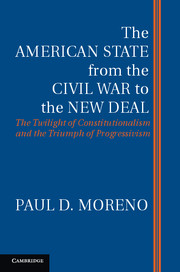 The American State from the Civil War to the New Deal
The American State from the Civil War to the New Deal Book contents
- Frontmatter
- Contents
- Abbreviations Used in the Footnotes
- Acknowledgments
- Introduction
- Part I The Old Regime
- Part II Early Progressivism
- Part III Late Progressivism
- 11 Wilsonian Progressivism
- 12 The New Freedom
- 13 The New Wilson
- 14 The Great War
- 15 The Return of the Regular Republicans
- 16 The Taft Court
- 17 The Last Progressive
- Part IV The New Deal
- Appendix A
- Appendix B
- Primary Sources
- Index
- References
11 - Wilsonian Progressivism
Published online by Cambridge University Press: 05 May 2013
- Frontmatter
- Contents
- Abbreviations Used in the Footnotes
- Acknowledgments
- Introduction
- Part I The Old Regime
- Part II Early Progressivism
- Part III Late Progressivism
- 11 Wilsonian Progressivism
- 12 The New Freedom
- 13 The New Wilson
- 14 The Great War
- 15 The Return of the Regular Republicans
- 16 The Taft Court
- 17 The Last Progressive
- Part IV The New Deal
- Appendix A
- Appendix B
- Primary Sources
- Index
- References
Summary
A DARWINIAN CONSTITUTION
The Taft–Roosevelt schism almost guaranteed the election of Woodrow Wilson. This most enigmatic of the three candidates appears in retrospect the most constitutionally radical. In his long academic career he had absorbed a good deal of German historicism. Wilson earned a Ph.D. at Johns Hopkins University, the institution founded to bring German research methods to the United States. He wrote in his first book, in 1885, that “We are the first Americans to hear our own countrymen ask whether the Constitution is still adapted to serve the purposes for which it was intended; the first to entertain any serious doubts about the superiority of our own institutions as compared with the systems of Europe; the first to think of remodeling the administrative machinery of the federal government, and of forcing new forms of responsibility upon Congress.” A year later, Wilson observed the “contempt everywhere felt and expressed, outside of French national conventions, for a priori constitutions.” Much better was the unwritten English constitution, which had evolved gradually in response to changing circumstances. He credited the American founders for their attention to experience rather than to reason. But they still wrote a constitution, and ours “illustrates the congenital weakness of its family.” The real constitution was the internal, cultural “constitutional morality of our race,” he observed. “In one sense, all governments must be governments of men, not of laws.” He frequently emphasized the pragmatism of the American founders, and their responses to contingent circumstances rather than their devotion to abstract ideas. He said of the natural rights philosophy of the Declaration of Independence in 1911, “I am constantly reminding audiences. . . that the rhetorical introduction to the Declaration of Independence is the least part of it. . .. If you want to understand the real Declaration of Independence, do not read the preface.”
- Type
- Chapter
- Information
- The American State from the Civil War to the New DealThe Twilight of Constitutionalism and the Triumph of Progressivism, pp. 129 - 137Publisher: Cambridge University PressPrint publication year: 2013


